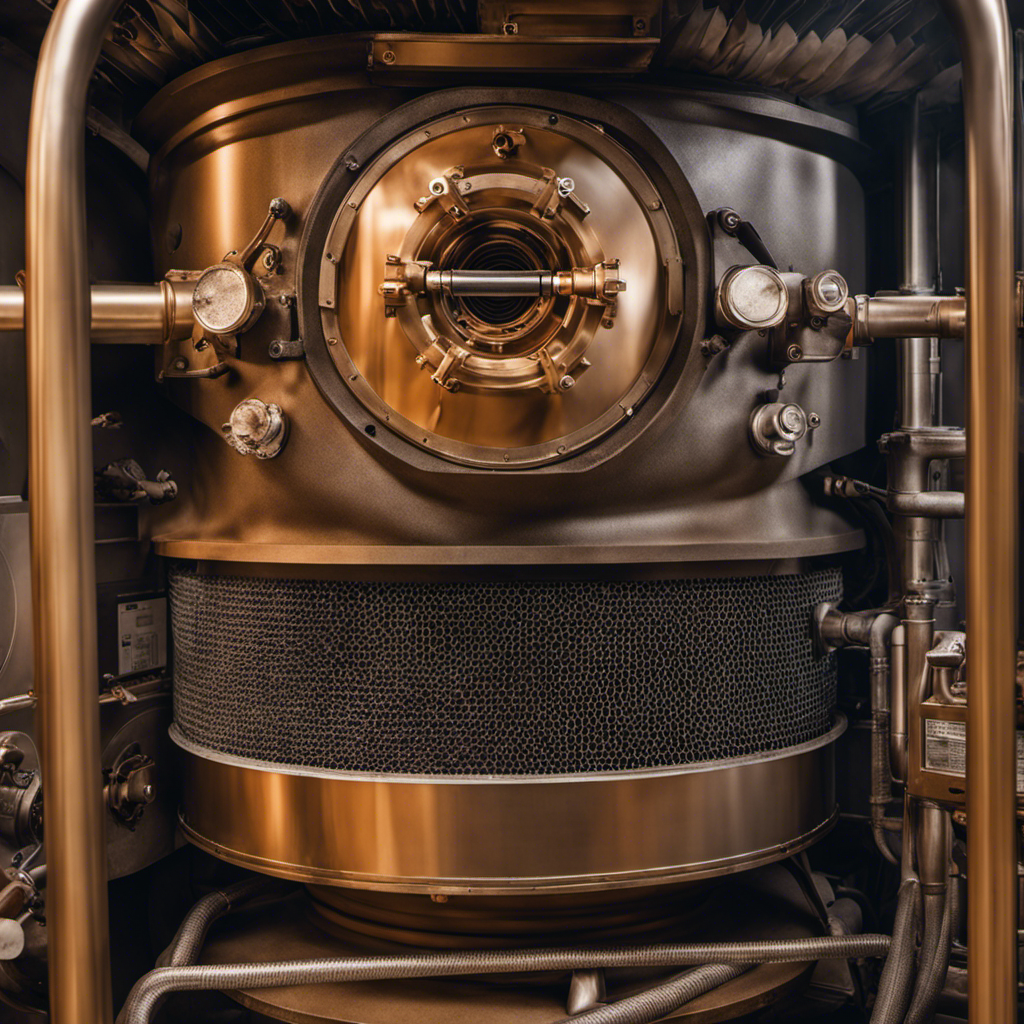In this article, we will explore the correlation between a dirty furnace filter and the possibility of your furnace stopping running.
As homeowners, it is crucial to understand the importance of maintaining a clean furnace filter and the potential consequences of neglecting this task.
By examining the signs of a dirty filter, the effects it can have on your furnace’s performance, and practical tips for filter maintenance, we aim to provide valuable insights for those seeking to serve their heating needs efficiently and effectively.
Key Takeaways
- Regular maintenance and cleaning of the furnace filter is crucial for efficient operation and longevity.
- A dirty filter can restrict airflow, leading to increased energy consumption, reduced efficiency, and potential breakdowns of the furnace.
- A dirty filter can also negatively impact indoor air quality, causing respiratory issues and allergies.
- Regular cleaning or replacement of the furnace filter improves energy efficiency, promotes a healthier living environment, and prevents system breakdowns.
The Importance of a Clean Furnace Filter
The regular maintenance and cleaning of a furnace’s filter is of utmost importance to ensure its efficient operation and longevity. Regular filter maintenance offers numerous advantages, including improved indoor air quality, reduced energy consumption, and enhanced system performance.
Many homeowners, however, have common misconceptions about furnace filters. One common misconception is that filters only need to be replaced once a year. In reality, filters should be checked and potentially replaced every one to three months, depending on usage and the type of filter.
Another misconception is that all filters are the same. Different filters have different MERV ratings, which measure their effectiveness in removing particles from the air. It is crucial to choose a filter with the appropriate MERV rating for your specific needs.
Signs of a Dirty Furnace Filter
One indication of a dirty furnace filter is a decrease in airflow throughout the heating system. When the filter becomes clogged with dust, dirt, and debris, it restricts the passage of air, causing a noticeable decline in the amount of air flowing through the vents.
This reduced airflow can result in several common symptoms that homeowners should be aware of. Firstly, the air quality in the home may deteriorate, leading to increased dust and allergens in the air. Secondly, there may be a decrease in the heating efficiency of the furnace, resulting in higher energy bills. Lastly, a dirty filter can also pose health risks, as it can allow pollutants and contaminants to circulate in the air, potentially causing respiratory problems or exacerbating existing conditions.
Regularly checking and replacing the furnace filter is crucial to maintain a clean and healthy indoor environment.
Effects of a Dirty Filter on Your Furnace
Over time, a dirty filter can have detrimental effects on the performance and longevity of your furnace. Ignoring the maintenance of your furnace filter can lead to various problems that may result in costly repairs or even breakdowns.
A dirty filter can restrict airflow, causing the furnace to work harder to heat your home. This increased strain on the system can lead to overheating, reduced efficiency, and ultimately, a breakdown.
Furthermore, a dirty filter can also have health effects on your household. It can become a breeding ground for bacteria, mold, and allergens, which can then circulate throughout your home, leading to respiratory issues and allergies.
To avoid these issues, it is crucial to regularly clean or replace your furnace filter and schedule routine maintenance to prevent any potential breakdowns and ensure the health and comfort of your home.
How a Dirty Filter Affects Energy Efficiency
Significantly, a dirty filter can negatively impact the energy efficiency of your furnace. When your furnace’s filter becomes clogged with dirt, dust, and debris, it obstructs the airflow, making it harder for the furnace to distribute warm air throughout your home. As a result, your furnace has to work harder and longer to reach the desired temperature, leading to increased heating costs.
Moreover, a dirty filter can also reduce indoor air quality. The accumulation of dust and pollutants in the filter can be circulated back into your home, potentially causing respiratory issues and allergies.
To maintain energy efficiency and ensure clean air, it is crucial to regularly clean or replace your furnace filter. By doing so, you can improve your furnace’s performance, reduce energy consumption, and promote a healthier living environment.
Tips for Maintaining a Clean Furnace Filter
How can you effectively maintain a clean furnace filter?
Regular cleaning and maintenance are essential to ensure the proper functioning of your furnace filter. One of the most important aspects of filter maintenance is cleaning frequency. It is recommended to clean or replace your furnace filter every one to three months, depending on factors such as the type of filter, the number of household members, and the presence of pets.
Neglecting regular cleaning can lead to common filter problems, such as reduced airflow, inefficient heating, and even system breakdowns.
To maintain a clean filter, start by turning off the furnace and removing the filter. Gently clean the filter with a vacuum or rinse it with water, then allow it to dry completely before reinstalling.
Regular maintenance will ensure that your furnace runs efficiently and provides clean, comfortable air for your home.
Frequently Asked Questions
Can a Dirty Furnace Filter Cause Damage to My Furnace?
A dirty furnace filter can cause damage to your furnace. Regular furnace maintenance, including clean filters, is important to ensure optimal performance and prevent issues such as restricted airflow, overheating, and potential breakdowns.
How Often Should I Replace My Furnace Filter?
Regularly replacing your furnace filter is essential to ensure proper functioning and prevent damage. The frequency depends on factors such as filter type and household conditions. Signs of a dirty filter include reduced airflow and increased energy consumption.
Is It Possible for a Dirty Furnace Filter to Cause a Fire?
A dirty furnace filter can impede airflow and reduce the efficiency of the furnace. While it may not directly cause a fire, neglecting filter maintenance can lead to overheating and other issues that could potentially pose a fire hazard. Regularly inspect and replace filters to ensure optimal performance and safety.
Can a Dirty Furnace Filter Lead to Health Problems?
A dirty furnace filter can lead to health problems such as allergies. Additionally, it can impact the energy efficiency of the furnace. Regularly changing the filter is essential to maintain a clean and healthy environment.
What Are the Common Reasons for a Dirty Furnace Filter?
There are several common causes for a furnace filter to become clogged, such as accumulated dirt, debris, and pet dander. To effectively clean a furnace filter, it is recommended to follow the manufacturer’s instructions and use appropriate cleaning methods and tools.


